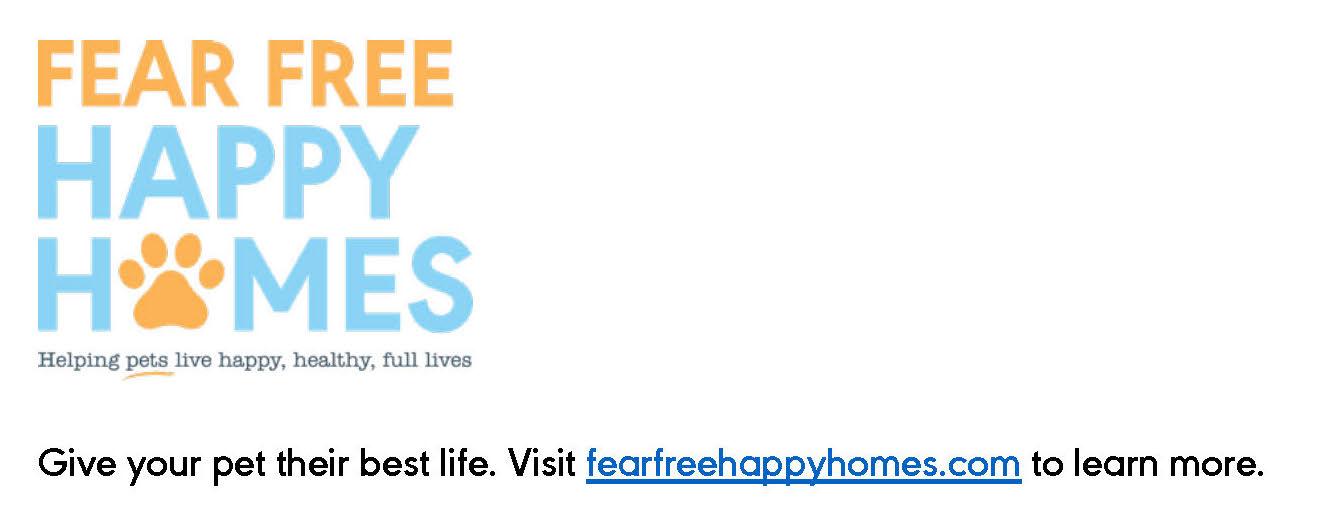

Just like people, dental disease impacts our pet’s health, from heart disease to an increased risk of developing cancer, and many places in between. At each patient’s annual wellness exam we make an oral health assessment, looking for evidence of dental disease, tumors, and other oral lesions. Homecare to prevent dental disease is recommended and encouraged, but at some point in all our pet’s lives a COHAC (complete oral health assessment and cleaning) will be recommended to maintain oral health. If this is delayed, surgical dental extractions will be required in the future. All dental procedures require the patient to be placed under anesthesia to allow for charting, dental radiographs (x-rays), and cleaning of all surfaces of each tooth to below the gumline.
Kincardine Veterinary Services puts Fear Free patient care first. The night before a procedure we pretreat all patients with an antiemetic to provide 24 hours of nausea prevention. Waking up from anesthesia feeling queasy is no fun and prevents rapid return to eating which delays recovery. We also recommend giving oral anxiety-reducing medications prior to arrival at the clinic so that the hospital stay is as relaxed and happy as we can make it. It can be a strange and scary experience for your fur baby to be away from their home and their people. We can avoid that. And if any oral surgery to extract diseased teeth is required, then 7 days of post op pain management is provided to ensure that your furry friend continues to be comfortable once home with you.
Frequently Asked Questions:
Why does my pet need to be under anesthesia for a dental procedure? Great question. Firstly, there is simply no way even the most well behaved and tolerant pet will allow gingival pocket probing, x-rays, and subgingival cleaning of all tooth surfaces (inside, outside and between teeth) without it. Secondly, dental instruments are sharp. Any movement of the head could lead to trauma and pain to your pet and should not be attempted. Thirdly, trying to restrain an awake patient in order to perform these procedures without anesthesia would result in high levels of fear, stress and anxiety that can easily be avoided with anesthesia. Using anesthesia allows us to perform a thorough, therapeutic dental cleaning without causing any unneeded mental or physical trauma to your pet. It’s what’s best for your fur baby.
Is anesthesia risky for my pet? Any sedation or anesthesia carries some risk. Best Medicine practices performed at Kincardine Veterinary Services reduces that risk as much as possible.
All of our patients have pre-anesthesia bloodwork performed prior to their procedure. This bloodwork screens for organ dysfunction, anemia, and for unknown infections to ensure that your pet will tolerate the anesthetic drugs. This also helps us to customize pain medications for your pet.
All of our patients have a physical exam the morning of their procedure. Heart and lung function will be assessed prior to any sedation being given. If we have any doubts about how your pet is going to respond or has responded, then we will contact you and discuss the concerns and possible solutions. Further assessment may be needed prior to anesthesia being performed and the procedure delayed until we feel it is safe, regardless of our schedule. We are not a corporate owned clinic so do not have any pressure to meet any “production numbers”.
All our patients have IV fluids before, during and after anesthesia, allowing for emergency drug administration if needed, blood pressure management throughout, optimized distribution and clearance of drugs from the body, and rapid anesthetic recovery to get your baby home as quickly as possible.
All of our surgical patients are continuously monitored by a registered veterinary technician (RVT) assigned to their case throughout their entire procedure. This allows even small changes in critical parameters such as blood oxygen (SpO2), expired carbon dioxide (ETCO2), respiratory rate, blood pressure, heart rate, ECG, and body temperature to be addressed immediately.
Lastly, we provide excellent multimodal pain management including extensive use of local anesthetic nerve blocks to prevent pain so we are able to reduce anesthetic needs to a minimum. This makes the procedure safer for your pet as they are just barely asleep.
Are dental x-rays really needed? Yes. 60% of your pet’s tooth structures are under the gumline and there is no other way to assess these structures without dental radiographs of all teeth. Besides, you don’t want to leave your pet with painful problem teeth until the problem becomes a visible crisis requiring further anesthesia and cost down the road. This is a crucial step in maintaining your pet’s comfort and health.
How long will my pet be in the clinic? Dental procedures are admitted at 8:40 am and discharged when they have recovered and are able to go home safely. Your pet will go home later that same day whenever it is convenient for you. If your schedule allows, they can go straight home for some continued tender loving care as soon as they are back on their feet again.
What do I need to do before my pet’s dental? We like to perform a ‘pre-operative’ appointment a few weeks before the procedure. This allows us to:
- attempt to collect our pre-anesthesia blood sample for testing, Sometimes this doesn’t happen and we will then aim to collect the blood sample on the day of the procedure. Even if we cannot collect the blood sample this helps us to gage how anxious your pet might be coming into the clinic for the procedure itself. We can then make plans for any additional anxiety reduction needs your furry friend may require.
- get an up to date weight and history for your pet, in case anything has changed.
- dispense our pre-operative medications for nausea and anxiety management, adjusted based on the response during this appointment.
- make sure that you understand the fasting requirements on the morning of the procedure and have a plan to ensure everyone in the household knows not to feed your pet that morning.
- go over the treatment plan in detail for the day of the procedure to ensure you know what specific care will be provided for your pet on that day and how much it is expected to cost. You will have received this treatment plan prior to booking, but we will go over it again with you at this appointment.
- discuss post op care so you understand what to do after the procedure. If any extractions are likely to occur, then a soft diet must be provided post op and this will need to be transitioned onto prior to the procedure.
- answer any questions you may have about the procedure or your pet.
Will my pet be painful after the procedure? Kincardine Veterinary Services provides excellent post op pain management to our patients. We start with oral pain medications before your pet even leaves home. While at the clinic we provide multimodal pain management to achieve patient comfort. A deep dental cleaning is uncomfortable so a post op injection of a 24 hour antinflammatory is given to all our patients so they remain pain free at home as they recover. If there has been any surgical extractions performed, then special, long acting nerve blocks are used prior to the surgery to prevent any pain sensation. And several post op medications will be sent home to provide 7 days of pain management.
The newest addition to our pain management protocol is laser therapy or “photobiomodulation.” This targets the damaged cells to help them regenerate and heal faster while also providing local analgesia to the gingiva. All our dental procedures are followed by a laser treatment.
What kind of care will my pet receive? A stay in the clinic can be quite stressful for any animal but we here at Kincardine Veterinary Services with our Fear Free and Caring First mentality take every opportunity to make your pet feel as comfortable as possible. Patient care is the priority for our team. Our kennel staff take great pride in providing your pet with all the TLC they can offer, using Adaptil or Feliway pheromones on soft, insulating bedding to ease any stress and anxiety your pet may experience while away from home. All our patients are kept as comfortably warm as possible through the application of coats placed on dogs on arrival or warm packs placed in kitty bedding for coziness. After the procedure, our RVTs will set up a webcam to monitor your pet up in their comfortable bed and the lights are kept dim so your pet may remain sleeping if they wish. When more awake, the dogs are walked outdoors on the property to relieve their full bladders after IV fluid therapy. Kitty litter boxes are closely monitored to maintain cleanliness and comfort. And everyone is offered food once sufficiently recovered. If your pet is on a special diet we would love for you to bring some of it with you at your pet’s admission appointment.
Does my pet receive post op care? Post-procedure checkups are important after any anesthesia or surgery as they allow us to ensure your pet has recovered appropriately. We will contact you the day after the procedure to ensure your first night has gone well. And an in person recheck in 7-14 days after the procedure will be performed. Clients are pretty surprised at how comfortable their pet is coming back to the clinic after their procedure. Great care shows! And of course our staff will remain available to you via email, text, or by phone for the following weeks should you have any concerns or questions about how your pet is doing. A safe and happy recovery is critical.



